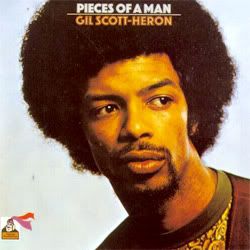 Gil Scott-Heron
Gil Scott-Heron
Pieces of a Man (1971)
Let me just get this out of the way: Gil Scott-Heron can't sing. Well, he can, but not well. One of the things that made the ballads of such soul artists as Curtis Mayfield and Marvin Gaye so compelling to listen to was the fact that they were being projected through the most endearing vocal cords on the planet at the time. Gil Scott-Heron certainly has the song arrangements to compete with them, but not the voice. I want to say that that's part of the reason why Scott-Heron is such an underground artist. He's better known for his powerful spoken word recordings, which are widely considered to be the precursors of hip hop. But his aspirations to be more than just a poet, while admirable, is probably what kept him from achieving greater success, rather than restricting him to lesser.
Though he never reached Mayfleid or Gaye's levels of popularity, you've heard of Gil Scott-Heron before. Or at least you've heard the saying "The Revolution Will Not Be Televised" before. This is the guy that originated it. Also featured on his hard to find debut Small Talk at 125th and Lenox, an updated version of the song with full instrumental backing opens Pieces of a Man. The songs' cult popularity doesn't exist for naught; it's absolutely flawless, and sadly still semi-relevant (update the names of the actors and politicians mentioned and it could've been recorded this decade...though the revolution never really comes as violently as anyone imagines). Perhaps the only complication with leading the album off with "The Revolution Will Not Be Televised" is the expectations it places on the rest of the album. If you're looking for any more raw spoken word tracks, prepare for disappointment: Pieces of a Man goes the soul/vocal jazz route for its remainder.
That may be a deal-breaker for some, but keep in mind that Gil Scott-Heron is a talented artist, so not all is lost. True, a few of the songs are pretty generic-sounding by today's standards (I'm halfway sure that "When You Are Who You Are" was used as background music in an auto insurance commercial a few years back) with cringe-inducing lyrical clichés, but thankfully there are a few standouts that make good use of storytelling to keep the listener interested. "Lady Day and John Coltrane" is an up-tempo, groovy track about drowning your sorrows by listening to your favorite musicians. "Home Is Where The Hatred Is" keeps the pace up with a tale of leaving a tumultuous living situation. The title track is a downtempo piano-driven ballad that tells about a father's breakdown after being laid off of his job.
The songs are carefully composed in such a way that works well for the vocal ability that he does possess, but at the end of the day you can't help but wonder what a more talented singer might've been able to accomplish with the same songs. Perhaps more interesting would've been to hear them in spoken word form, though I suppose there's no point in dwelling on what could've been. I can't blame an artist for wanting to branch out of his comfort zone, so taking this album as it is, you could do a lot worse.
Score: 7/10
"The Revolution Will Not Be Televised"
"Lady Day and John Coltrane"
Friday, April 10, 2009
Gil Scott-Heron - Pieces of a Man (1971)
Labels:
1971,
gil scott heron,
pieces of a man,
review,
soul
Subscribe to:
Post Comments (Atom)






No comments:
Post a Comment